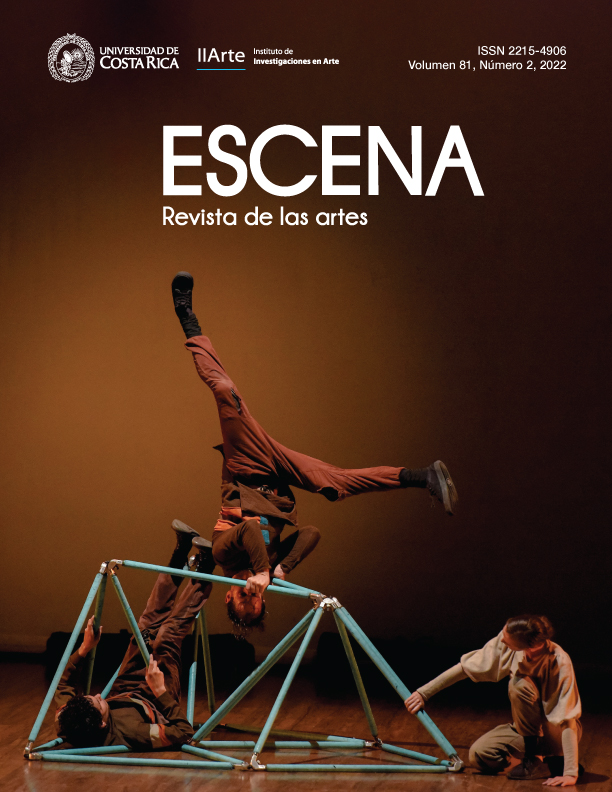Abstract
In the context of recent technological and economic changes mediated by an algorithmic capitalism, the present work studies the change that implies the incursion of platforms in the music industry, as well as their consequences regarding the consumption and production of music. Special attention will be put to the case of Latin America. This analysis includes a review of recent changes in the digital economy through the notion of art worlds. It is evident the emergence of a new actor in the music industry, which assumes roles such as the distribution of musical works and artistic curatorship, thus altering the networks of cooperation and dependence in the music industry. These transformations do not only occur on a global scale, but have potential effects for the Latin American case.
References
Adorno, T., & Horkheimer, M. (1971). Dialéctica del iluminismo.Buenos Aires: Sur.
Becker, H. (2008). Los mundos del arte. Sociología del trabajo artístico. Buenos Aires: Universidad Nacional de Quilmes.
Cabezas, D. (2018, abril 27). Spotify es una ruina para (casi todos) los músicos. La sexta. [Página web]. Recuperado de https://www.lasexta.com/tribus-ocultas/musica/spoti-fy-ruina-casi-todos-musicos_201804245ae2fd810cf24223906a5d65.html
Daum, T. (2019). El capital somos nosotros: Crítica a la economía digital. San José: Uruk Editores.
Eriksson, M. (2020). The editorial playlist as container technology: on Spotify and the logistical role of digital music packages. Journal of Cultural Economy, 13(4), 415-427. DOI:10.1080/17530350.2019.1708780
Eriksson, M., & Johansson, A. (2017). Time, functionality and intimacy in Spotify’s featured playlists. Cultural Analysis, 16(1), 67-82.
Eriksson, M., Fleischer, R., Johansson, A., Snickars, P., & Vonderau, P. (2019). Spotify Teardown: Inside the Black Box of Streaming Music. Massachusetts: The MIT Press.
Fleischer, R. (2020). Universal Spotiftication? The shifting meanings of “Spotify” as a model for the media industries. Popular Communication, 19(1), 14-25. DOI: 10.1080/15405702.2020.1744607
García Canclini, N. (2005). La cultura extraviada en sus definiciones. En N. García Canclini (ed.), Diferentes, desiguales y desconectados: Mapas de la interculturalidad (pp. 29-44). Barcelona: Gedisa.
Iqbal, M. (2020). Spotify usage and revenue statistics (2020). Bussines of apps. [Página web]. Recuperado de https://www.businessofapps.com/data/spotify-statistics/
Jáuregui, J. (2015). Streamingmusical en Spotify: ubicuidad entre géneros y estados de ánimo. Inmediaciones, 10(10), 76-90. DOI: 10.18861/ic.2015.10.10.2587
Kasap, O., & Yalcintas, A. (2020). Commodification 2.0: How does Spotify provi-de its services for free? Review of Radical Politicasl Economics, 53(1), 1-16. DOI: 10.1177/0486613420924163
Marshall, L. (2015). “Let’s keep music special. F-Spotify”: On-demand streaming and the controversy over artist royalties. Creative Industries Journal, 8(2), 177-189. DOI: 10.1080/17510694.2015.1096618
Mejías, U.A., & Couldry, N. (2019). Colonialismo de datos: repensando la relación de los datos masivos con el sujeto contemporáneo. Virtualis, 10(18), 78-97.
Milan, S., & Treré, E. (2019). Big Data from the South(s): Beyond Data Universalism. Television & New Media, 20(4), 319-335. DOI: 10.1177/1527476419837739
Negus, K. (1998). Cultural production and the corporation: musical genres and the strategic ma-nagement of creativity in the US recording industry. Media, Culture & Society, 20(3), 359-379.
Prey, R., Del Valle, E.M., & Zwerwer, L. (2020). Platform pop: disentangling Spotify’s in-termediary role in the music industry. Information, Communication & Society, 1-19. DOI: 10.1080/1369118X.2020.1761859
Ritzer, G., & Jurgenson, N. (2010). Production, Consumption, Prosumption: The nature of capitalism in the age of the digital ‘prosumer’. Journal of Consumer Culture, 10(1), 13-36. DOI: 10.1177/1469540509354673
Siles, I., Segura-Castillo, A., Solís, R., & Sancho, M. (2020). Folk theories of algorithmic recommendations on Spotify: Enacting data assemblages in the global South. Big Data & Society, 7(1), 1-15. DOI: 10.1177/2053951720923377
Siles, I., Segura-Castillo, A., Solís, R., & Sancho, M. (2019). Genres as social affect: Cultivating moods and emotions through playlists on Spotify. Social Media + Society, 5(2), 1-9. DOI: 10.1177/2056305119847514
Spotify. (2020). Shareholder letter 2019 Q4. Recuperado de https://investors.spotify.com/financials/default.aspx
Srnicek, N. (2018). Capitalismo de plataformas. Buenos Aries, Argentina: Caja Negra Editora.
Stafford, S.A. (2010). Musical in the digital age: the emergence of digital music and its repercussions on the music industry. The Elon Journal of Undergraduate Research in Communications, 1(2), 112-120.
Sterne, J. (2006). The mp3 as cultural artifact. New media & society, 8(5), 825-842. DOI: 10.1177/1461444806067737
Topper, I. (2014, noviembre 5). “Estoy harto de esa izquierda que no quiere ganar”. M’sur. Recuperado de https://msur.es/2014/11/05/slavoj-zizek/
Vonderau, P. (2019). The spotify effect: digital distribution and financial growth. Television & New Media, 20(1), 3-19. DOI:10.1177/1527476417741200
Wikström, P. (2014). Cambio. La industria musical en una era de distribución digital. New York: BBVA Open Mind.
Winner, L. (2008). La ballena y el reactor: Una búsqueda de los límites en la era de la alta tecnología. Barcelona: Gedisa.
Zuboff, S. (2019). The Age of Surveillance Capitalism: The Fight for a Human Future at the New Frontier of Power. New York: Profile Books.
Comments

This work is licensed under a Creative Commons Attribution-NonCommercial-NoDerivatives 4.0 International License.
Copyright (c) 2022 Tadeo Masís González



